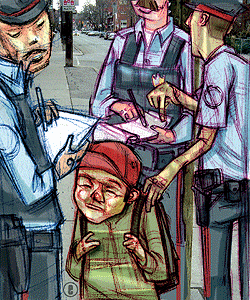When can the police stop me?
A police officer can stop and ask you questions at any time, but unless they are arresting you, detaining you to investigate you for a crime, or writing you a ticket, they must let you go if you do not want to talk with them.
What are my rights when being detained or arrested?
The police must tell you of your rights immediately upon detention. The police must tell you why you are being detained, and that you can get legal advice from a lawyer. If you don’t know why you are being detained, you should ask, “why am I being detained?” You can tell the police that you do not want to speak to them until you have the chance to talk to a lawyer. If the police continue to question you, you should not say anything and ask again to speak to a lawyer.
Not everyone has a criminal lawyer that they know, so the police have an obligation to tell you about a free criminal lawyer service, called Duty Counsel. Duty Counsel is available to you 24 hours a day and 365 days a year. The police must provide you with the phone number for Duty Counsel and a phone where you can speak to the lawyer in private.
When the police ask you if you want to speak with a lawyer, you should always answer ‘yes.’ If you are taken to a police station, the police should take you to a private room so you can call your lawyer or the Duty Counsel.
The law is not clear on how the police should help you talk to a lawyer when they are detaining you but not taking you to the police station. You may want to ask if you can call a lawyer on your cell phone, but it is not clear on how your right can be respected in these circumstances.
The biggest thing to remember is that anything you say to the police can be used against you, and that you have the right to say nothing except identify yourself and ask to speak to a lawyer.
How do I know if I am detained by the police?
Detention is when the police lawfully hold you by taking away your freedom, making it so you cannot walk away. You can be physically and/or psychologically detained by the police. This means that you do not need to be handcuffed or placed in the backseat of a police cruiser to be detained. If you are no longer free to go, you are being detained. It is important for you to know if the police are investigating you and whether or not you are free to go. If you are unclear, you should ask the police officer, “am I free to go?” If the officer tells you that you are free to go, then you can decide to keep talking with the police, or to go on your way.
Can I be detained for any reason?
The police may only detain you if they believe that you are connected to a recent or ongoing criminal offence and that detaining you is necessary. Your detention should be as brief as possible. If there is not a clear connection between you and the crime, then the police officer may be detaining you “arbitrarily” (without good reason). This type of detention is unlawful.
Getting arrested?
An arrest by an officer could include any of the following:
- they inform you that you’re under arrest
- they touch you in a way that exerts some force
- they create a situation where you are unable to leave
If you are arrested, the police are required to notify your parent(s) whether you want them to or not.
Statements to the police
The most important piece of advice that a lawyer will give you is to not make statements to the police. The police can record anything you say. The police are also allowed to use tricks, such as lying to you, in order to convince you to provide a statement. It can be a stressful and intimidating experience to deal with the police when they are investigating you for an offence and you should usually not give a statement at that point.
What if I want to give a statement?
Giving a statement means answering questions or talking to the police about what happened. You have the right to have a lawyer and your parent(s), or an adult with you before and while you make a statement. The police must tell you about this right. If you want to make a statement, you should wait until a lawyer who you have contacted is present, and you have talked to your lawyer in private.
If you “blurt out” a statement before the police officer has had a chance to tell you about these rights, they may still be able to use your statement against you. Even if they forget to tell you about your rights, a judge might agree that your statement can be used as evidence.
The police are telling me that I can make a statement without talking to a lawyer first. Is this right?
It is legally correct. You can “waive” or give up your right to talk to a lawyer and/or your parent(s) before making a statement, but it is not a good idea to do this. Normally, the police officer must videotape you or get you to sign something saying that you agree to this. Even if they do not do this they may still use your statement in court, as long as they can show that your decision was voluntary.
If I do make a statement to a police officer, how will it be used?
Anything you say that shows you were involved in an offence can be used against you in court. Refusing to sign a written statement will not stop it from being used against you in court. If you want to make a statement, you should wait until you have talked to a lawyer and the lawyer is with you.Any statement you make to the police can only be used if it is given voluntarily. If you have made a statement without talking to a lawyer first, check with your lawyer after the statement to see if it was made voluntarily.
** If you make a statement in order to be eligible for extrajudicial measures (EJM), your statement can not be used against you in court.
Do I have to give my name and address?
There are some situations where you must tell the police your name and address. An example is when you are driving a car or bicycle and the police stop you. Other times, you have no legal obligation to give your name and address, but there is a risk that you may be charged with obstructing justice if the police had a right to know your name and you did not give it.
If the police have lawful authority to request your name and you give an incorrect name, then you could be charged with obstructing justice.
You do not have to answer any other questions, and you have a right to say nothing further to the police. Be careful about providing any information beyond your name because anything that you say can be used against you.
When can I be searched by the police?
The police may only search you in four situations:
- If the police have a search warrant;
- If you are being detained and investigated by the police for a criminal offence (safety search only);
- If you are being arrested by the police for allegedly committing offence; and/or
- If you give your permission to the police.
Search warrants
Usually, a search warrant allows the police to search a place (for example, an apartment or a storage locker), but the police could also get a warrant to get DNA (in other words, a blood, hair, or saliva sample). If the police come to your place with a search warrant, you should ask to see the warrant and check for certain things. Make sure that:
- the address on the warrant is your address
- the police are at your house at a time the warrant says they can be there
- the warrant is signed by a judge or a justice of the peace
- the police only check in places where the item(s) they are allowed to look for could actually be (e.g.: they cannot search for a stolen piano in a cookie jar)
Search on detention
If the police are detaining you and have a reasonable suspicion that their safety or the safety of others is at risk, then they may search you. A safety search is usually a pat-down of your clothing to feel for weapons, but sometimes it is also lawful for the police to search through your bag.
Search on arrest
If you are being arrested, then the police may search you and your property for safety reasons and also to gather evidence linked to the crime.
If the police unlawfully search you and find illegal things, then you can tell a judge that the illegal things found should not be used as evidence against you in court because the police used illegal practices to find the items.
Search with your permission
If you give the police permission to search you and it was found that you were not detained, then you can be charged for any illegal items they find on you.
Do not physically resist being searched
If you don’t want the police to search you, you should tell them that you do not consent to the search. However, even if you believe that the police are illegally detaining or searching you, you should not resist. If you physically resist, you may be charged with resisting arrest or assaulting a police officer.
Your rights violated?
If you believe that a police officer has violated your rights or acted improperly, you should collect as much information about the incident as possible and speak to a lawyer for advice. See section on Police Complaints.




